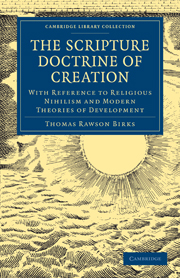 The Scripture Doctrine of Creation
The Scripture Doctrine of Creation Book contents
- Frontmatter
- Contents
- INTRODUCTION
- CHAPTER I ON RELIGIOUS NIHILISM
- CHAPTER II ON RELIGIOUS NIHILISM (continued)
- CHAPTER III THE ALLEGED LAW OF SCIENTIFIC PROGRESS
- CHAPTER IV THE BEGINNING
- CHAPTER V THE CREATION OF MATTER
- CHAPTER VI ON INFINITE SPACE
- CHAPTER VII ON FORCE, LAW, AND NECESSITY
- CHAPTER VIII ON CREATION AND LIFE
- CHAPTER IX ON CREATION AND EVOLUTION
- CHAPTER X EVOLUTION AS AN INDUCTIVE THEORY
- CHAPTER XI ON CREATION BY LAW
- CONCLUSION
CHAPTER VI - ON INFINITE SPACE
Published online by Cambridge University Press: 29 August 2010
- Frontmatter
- Contents
- INTRODUCTION
- CHAPTER I ON RELIGIOUS NIHILISM
- CHAPTER II ON RELIGIOUS NIHILISM (continued)
- CHAPTER III THE ALLEGED LAW OF SCIENTIFIC PROGRESS
- CHAPTER IV THE BEGINNING
- CHAPTER V THE CREATION OF MATTER
- CHAPTER VI ON INFINITE SPACE
- CHAPTER VII ON FORCE, LAW, AND NECESSITY
- CHAPTER VIII ON CREATION AND LIFE
- CHAPTER IX ON CREATION AND EVOLUTION
- CHAPTER X EVOLUTION AS AN INDUCTIVE THEORY
- CHAPTER XI ON CREATION BY LAW
- CONCLUSION
Summary
The doctrine that Matter is created, the result of a work of divine will and power, has been obscured or denied by reasonings drawn from our conceptions of Space. The creation of Matter, it has sometimes been urged, requires us to hold the creation of Space also, which is said to be inconceivable.
In “First Principles,” where this argument occurs, it agrees ill with the chapter on Ultimate Scientific Ideas, which presently follows. All the alternatives, that Space is subjective, and a form of thought only; that it is a non-entity, an attribute, a real entity, and thus either finite or infinite, are affirmed in turn to be unthinkable and inconceivable. How, then, can we safely infer, in such darkness, that it is an external entity, needing creation as much as Matter, or that its creation is harder to conceive than its bare existence alone? Still the conception of Space as a real existence, prior to Matter, and independent of the Divine will, seems often to be a covert defence of Atheistic Materialism. If this mighty void, Infinite Space, has a real and necessary existence before any creation, and wholly independent of the Creator, is it much harder to conceive that Matter, the shifting and variable contents of this Infinite Space, may also be uncreated, and exist from all eternity?
Here three main questions arise. Is Space only subjective, a form of thought, or objective, that is, either an entity, or some relation or attribute of things themselves?
- Type
- Chapter
- Information
- The Scripture Doctrine of CreationWith Reference to Religious Nihilism and Modern Theories of Development, pp. 128 - 142Publisher: Cambridge University PressPrint publication year: 2009First published in: 1872


